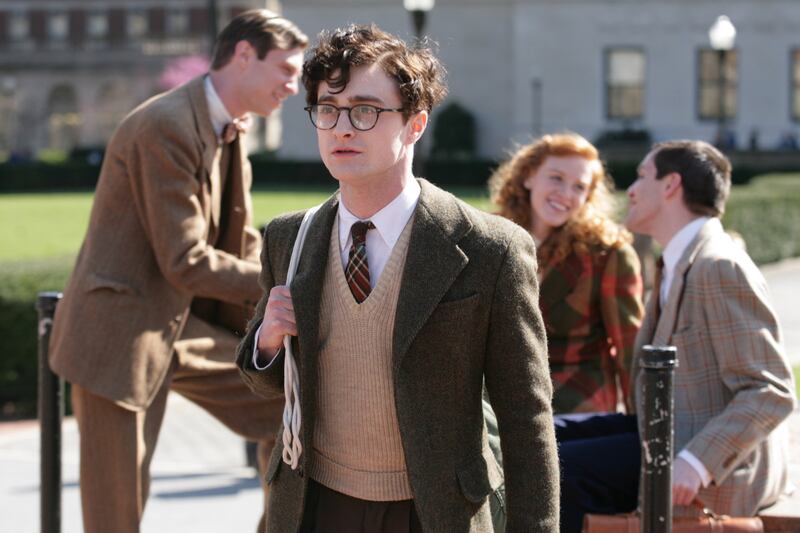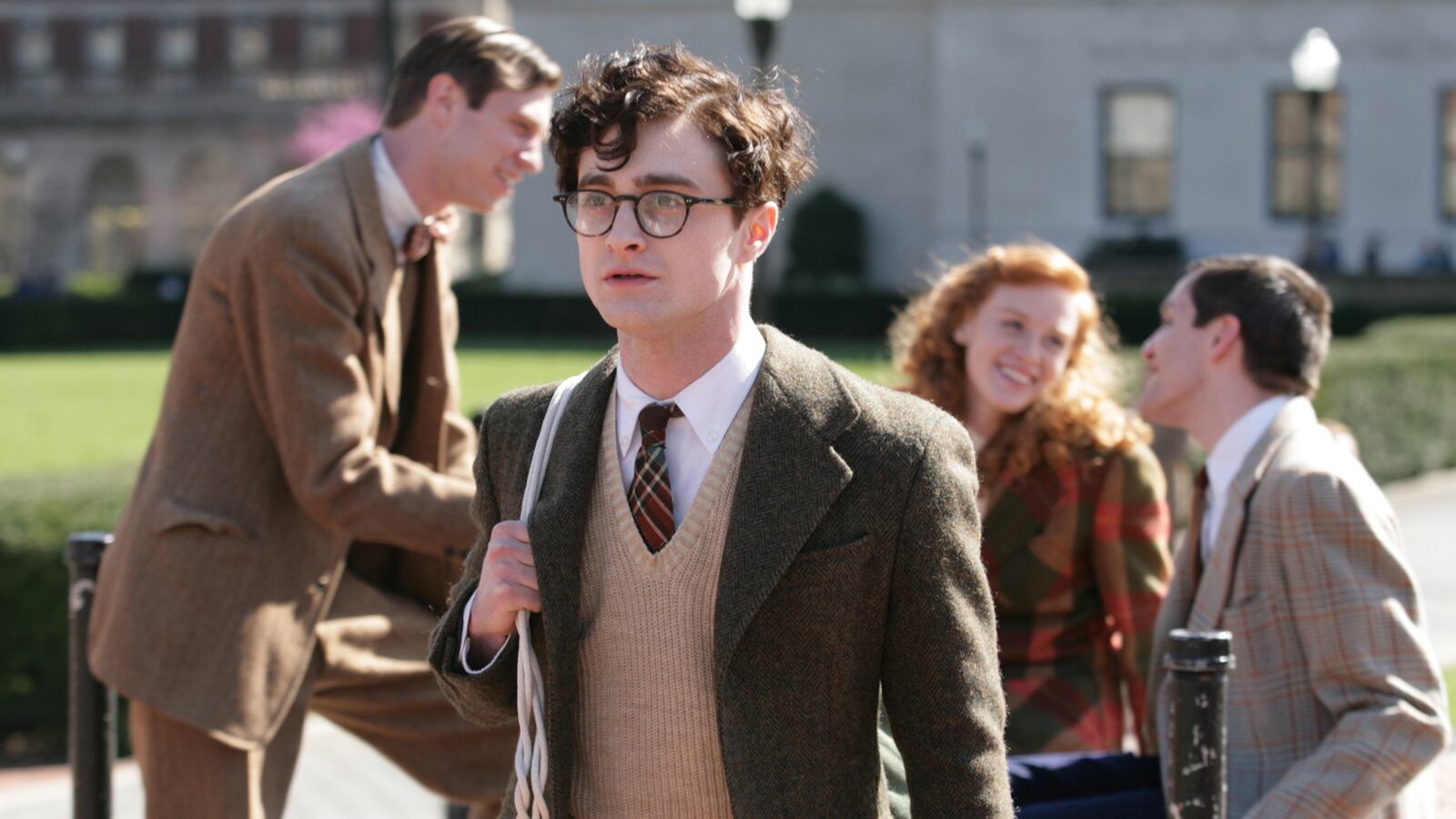Daniel Radcliffe, the diminutive, wide-eyed boy-wizard from the Harry Potter films, isn’t a kid anymore. He’s 24. And the boyish visage and slightly mischievous grin notwithstanding, he’s come quite a long way as an actor. With the exception of the largely overlooked December Boys, Radcliffe spent a decade (2001-2011) starring in and promoting the aforementioned highest grossing film franchise of all time.

With Potter firmly in his rearview, the spry Brit has hit the ground running, appearing in three wildly disparate indie films that screened at the 2013 Toronto International Film Festival. The first to hit theaters—and best, in this writer’s opinion—is Kill Your Darlings.
The film, directed by John Krokidas, is set in 1944 and follows Allen Ginsberg (Radcliffe), then a freshman at Columbia University, who befriends—and eventually becomes infatuated with—the charismatic Lucien Carr (Dane DeHaan). When Carr murders his creepy ex-lover, David Kammerer (Michael C. Hall), the Beat Generation’s finest young voices-to-be, Ginsberg, William S. Burroughs (Ben Foster), and Jack Kerouac (Jack Huston), all find themselves under investigation. And Radcliffe displays heretofore-unforeseen levels of vulnerability and torment as the conflicted Ginsberg in what is without question the finest performance of his young career.
You seem to be very adept at playing students, whether it’s Harry Potter, December Boys, or Kill Your Darlings. Is that an unrequited dream, going to school?
No, I didn’t wish I could have gone to school more or anything like that. I think a lot of it is just the age I am and the fact that I’ve been acting since I’ve been very young. But I think also, in terms of Allen, there’s a thing that goes along with his studiousness, which is a curiosity and an excitement about knowledge. If you can imagine Allen in Paterson, New Jersey, wanting to write poetry and thinking, “Christ…this is terrible!” and then suddenly be in an environment where everyone is talking about poetry, and your intellect is valued, must have been incredibly exciting. I have a sense of that because I love poetry.
You wrote some poetry under a pen name [Jacob Gershon], right?
Well, yeah, a while ago! It’s stuff that I’m really…ugh. It’s fine. It was stuff that I wrote at 17 and it’s perfectly fine for a 17-year-old. Although when I listen to Laura Marling’s lyrics I think, “Jesus! How the hell did she do that at 17?” But when you’re a teenage boy saying, “Hey, do you want to read some poetry?” Not many fucking people are into it, man, so I can definitely associate with the instinct of seeing something people see as nerdy be valued, but also the sense of moving from Paterson, where you’ve been all your life, to Columbia University, and feeling that you instantly belong. That is very similar to me when I got Potter. I was at a much younger stage of development, but I had been in school, and then I got put on that set and realized, “Oh…I’m happy here! I feel comfortable here and belong here, and my insane energy levels aren’t trying to be trounced down by teachers but are actually encouraged.”
This is actually a love story…
…Totally! Points for you for being the first person to not call it a “gay love story.”
Do you remember the first time you fell in love or thought you were in love?
Oh, yeah. Absolutely. I’m also lucky enough to never fall in love with someone as emotionally cruel as Lucien Carr, so I’ve never had my heart broken in quite the same gut-wrenching way. When I thought I was first in love was when I was 14 and met my 14-year-old girlfriend. You have that thought of, “Oh, yeah, we’re going to be together forever,” and I remember being devastated after that, but in that very teenage way where you look back on it like, “Jesus Christ! Pull yourself together, man, you’ll go through worse than that.” But that was the first time I said, “I love you.”
Were you dumped?
You know, we lived on opposite sides of the fucking country, so it was one of those, “Do you want to not do this anymore…this is really difficult,” after eight months of seeing each other. I’m trying to avoid saying “it was mutual” because then it’s going to sound like I was dumped, but I assure you I wasn’t dumped! [Laughs]
The Beat Generation is also associated with drug culture, and there are some great scenes of Ginsberg, Burroughs, and Carr, popping loads of benzedrine. Have you ever had a transcendent drug experience of your own?
No, honestly. I know that I don’t have the right mental setup to do a lot of drugs. I’ve always had that awareness. Because when you’re younger, you hear people talk about mushrooms, which were really big at my school, and I’d think, “I would lose my fucking mind.” I would be the guy who thinks he could fly and do something stupid. Also, I don’t go along with the idea that you have to do a shitload of drugs to get creative, either.
Brandon Flowers is a Mormon.
Exactly, which is still mad to me! I met [The Killers] when they were touring England, and it was the first time I’d ever been backstage to meet a band, and I thought, “Fuck, this is going to be so rock ‘n’ roll!” and I went back there and they were looking for a bottle opener because they hadn’t got one, so I said, “Yeah, I’ve got one!” but then my obnoxious friend who I was with barged past them and nicked one of their beers. I’m sure they still have fond memories of me!
You’re on the rider now: no more Radcliffe. Now as far as the love scenes go, a lot of people are focusing on your gay love scenes in the film. Almost every headline to every story I read about Kill Your Darlings focuses on this, which is sort of a shame, because it’s a very good film.
Exactly. It’s an easy headline, and it will get attention. I get that. Ultimately, I’m quite practical about it in that if people go and see the movie because they were coaxed in by salacious headlines, fine! They’re still going to see the movie. People came in to see Equus because they’d heard about the nude scene, but they still left having seen Equus. And sure, there were probably people who just went in to see the nude scene and went out, but there were also people who went in and came out like, “Whoa, I didn’t know it was about this. This is really intense.” I think the same thing will happen with this film.
It’s a very genuine love scene, too. You don’t usually see that mixture of vulnerability and excitement when a character loses his virginity onscreen, regardless of his or her sexual orientation.
Definitely. We were talking about what we both wanted from the scene, and John said, “I want it to be the authentic loss of gay virginity scene that I have never seen before”—by which we don’t mean we have to be graphic, because it’s not. It’s really all about the faces—the fear, pain, excitement, and all the things Allen is experiencing in that moment. It’s also about where it comes in the film. Allen’s just been left by Lucien and is an emotional fucking wreck, so it’s a really intense love scene. Somebody called it “steamy” the other day, and I said, “It’s sensual, but I wouldn’t call it steamy.”
Daily Mail?
[Laughs] It’s highly likely! It’s crazy to me that people know that paper outside of the U.K., but it’s got such an online presence. Here’s a fun thing to do on the Daily Mail website: go into the “search” thing and type in the words “all grown up,” and it’s just girls around their 16th birthday being chased around by the paparazzi. That’s how they frame it to make it seem acceptable. It’s mad. But going back to it, it’s a very beautiful, vulnerable, tender scene.
This is the first time you’ve played a gay character. Did you feel a certain responsibility to turn in a genuine portrayal of a gay icon and not some lazy caricature?
Abso-fuckin-lutely there is. And there was nothing remotely camp about Allen. He was gay, he wasn’t campy or kitsch in the slightest from what I’ve heard about him, so to do a caricature would be completely wrong. For Lucien, many of the actors who came in to audition for him were “playing gay”—but very heavily—and the point with Lucien is that he’s very sexually ambiguous and then went off and became married. I didn’t view it as playing a gay character, just a character who happened to fall in love with a guy. The responsibility I felt, mainly, was to not give any undue weight to the fact that they were gay, because that’s, to me, when it becomes patronizing. People have been saying it’s a “gay love story,” but there’s nothing different.
It’s a “first love” story.
Exactly. It’s the most universal fucking feeling there is, practically! And people clearly want me to say, “It was weird to do a gay sex scene.” But it wasn’t. It was just a job. It was awkward in the way that any sex scene is slightly awkward in that you’re getting naked in front of someone you just met, and there’s dudes around holding lights and cameras, but it’s giggly awkward, not “Oh, there’s a man touching me!” awkward. And frankly, I was naked in a scene [in Equus] about sexual failure and horse blinding—live onstage—so this is actually a less intense version of a nude scene.
I read that you and your co-star Jon Hamm [from A Young Doctor’s Notebook] play Words with Friends. Who wins?
We’ve both won. I beat him the first game we ever played, but then he beat me.
Do you think he’s cheating with freeze-ups—or is that Scramble with Friends?
Oh, that’s Scramble with Friends. Scramble is the game I had to stop playing with my girlfriend because she just annihilates me and I became so depressed. But it was pretty easy between Jon and me. The best Scrabble game I could come up with would be me, Jon Hamm, and Dane DeHaan. We’re all very competitive and good at Scrabble.
How do you feel about your career trajectory? You’ve had an opposite trajectory to most actors in that you did a huge blockbuster franchise and now seem to be exploring more creatively, dabbling in indies.
One fed into the other. When you’re 12, 13, you don’t really have peers as an actor other than the ones you’re on set with. But when you get to 16, 17, you become very aware of guys like James McAvoy, Ben Whishaw, Aaron Johnson, Eddie Redmayne—who are doing such diverse stuff and mixing up indies and blockbusters. It builds up a desire in you, like, “I want to do that!” So since getting out of Potter, I’ve been doing just that. Plus, I don’t like repeating myself. It’s more fun to test yourself and see what you can do rather than fall back on the thing you know you can do. And I’m at that stage of my career where I want to find out what I can do, because I’ve only started to be tested in new ways since finishing Potter. So far, at least, I’m very happy with the way things are going. It is a unique trajectory, but hopefully I can capitalize on its uniqueness.






